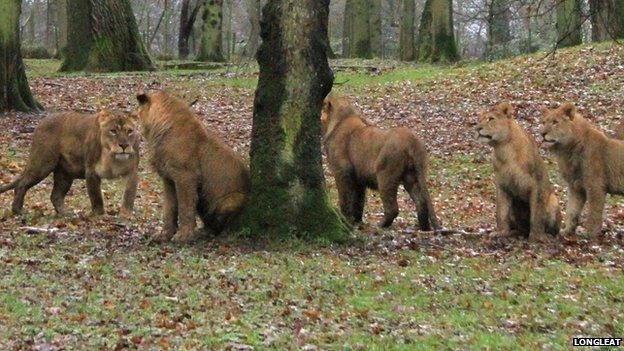Longleat lions destroyed 'because of genetic defects'
- Published

Longleat Safari Park said it initially thought the lioness was suffering from the effects of poor nutrition
Five lions were destroyed at Longleat Safari Park because they had serious genetic defects caused by inbreeding, managers said.
In a statement, the Wiltshire park said it had no choice but to put down a lioness and her cubs because they displayed "odd aggressive behaviour".
A sixth lion was destroyed after the lioness attacked it.
Longleat said the lioness's behaviour was due to "poorly managed genetic history prior to her arrival".
'Neurological problems'
The lioness, called Louisa, was 18 months old when she arrived at the park and was initially thought to be suffering from the effects of poor nutrition.
However, it became "apparent that she was suffering from neurological problems" as a result of "relatively high levels of inbreeding", the park said.
The four cubs also showed signs of neurological problems such as "incoordination and odd aggressive behaviour that were not considered normal or appropriate compared to other animals within the collection".
The park said it had never seen these problems in the many other cubs born there over the years and has an extremely good nutritional programme meaning that dietary inadequacies have never been an issue.
It also felt it would have been irresponsible to move the animals to another collection.
The park added that no responsible zoo would take the lions with their "genetically-related health issues".
It took "the utmost care in trying to protect the welfare and safety of all our animals" and it "reluctantly decided that euthanasia was the responsible option", it added.
Saddened
Longleat obtained the lioness from Noah's Ark Zoo Farm near Bristol in 2011.
In a statement, Noah's Ark said it was "saddened" by the news and confirmed that Louisa was in good health when she left. It said it still houses her two brothers and they have shown no signs of any neurological problems.
Noah's Ark said Louisa and her two brothers were originally bred in Linton Zoo in Cambridge.
It added that "these historical issues predate Louisa's time at Longleat, Noah's Ark Zoo Farm and Linton Zoo and are no reflection of the standards of care given at the parks".
"Longleat have significant experience caring for and breeding lions so we are confident they have made these difficult decisions based on expert guidance and have the best interests of their animals at the centre."
'Enormous pressure'
Dr Pieter Kat, who runs Kent-based charity Lion Aid, said most zoos have used a system of international stud books for many years, which means there should be "no reason" they should end up with inbred animals.
He added that "there is no reason why, if you suspect inbreeding, you should breed from that animal".
"I would question why Longleat felt the need to breed lions... breeding is entirely preventable through the use of a contraceptive pill and it all comes down to proper zoo management," he said.
"Zoos are under enormous pressure to produce babies... they are a big attraction for the public and zoos want to have lots of babies."
Will Travers, President of the Born Free Foundation, said: "We were saddened and concerned to hear of the destruction of six lions at Longleat.
"If uncontrolled breeding has contributed to the deaths of these lions, then Longleat must be held to account."
Longleat said: "We feel strongly that a lioness should be able to behave normally and be given the opportunity to breed where appropriate" but that this must be "balanced with careful overall population management".
The park said after Louisa lost her first litter of cubs in early 2012 a second, unplanned litter, came soon after without any subsequent mating having been witnessed.
At that stage it believed the neurological condition was related to Louisa's inappropriate nutrition as a cub and that her cubs, in an appropriate environment, would be healthy.
When it became apparent this was not the case her parentage and genetic background were reviewed and the high level of inbreeding in her distant genetic past was discovered.
The British and Irish Association of Zoos and Aquariums (BIAZA), which represents "the best zoos and aquariums" in Britain and Ireland, said the decision to kill the lions "was made on welfare grounds" and "required to alleviate physical suffering".
"BIAZA will be working with Longleat to ensure that correct procedures have been followed and are continued in future," it said.
Related topics
- Published9 February 2014
- Published27 September 2013